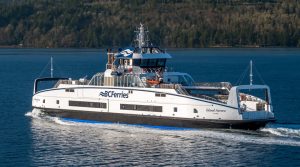
VICTORIA – BC Ferries released its year-end results today for the fiscal year ended March 31, 2021 (fiscal 2021). The COVID-19 global pandemic has had a significant impact on the company’s operations and financial results. During the year, BC Ferries carried 13.1 million passengers and 6.7 million vehicles, a decrease of 40 per cent and 24 per cent, respectively, compared to the fiscal year ended March 31, 2020 (fiscal 2020).
These results represent a full 12-months of operations impacted by COVID-19, which has had unprecedented consequences to BC Ferries’ traffic and revenues over the year. However, BC Ferries expects financial results to continue to improve, in part due to Safe Restart funding and as the provincial economy recovers from the effects of the pandemic. The company remains optimistic that traffic will begin to return as more travellers become vaccinated and as the Provincial Health Officer eases travel restrictions.
In December 2020, BC Ferries received $308 million through the Safe Restart Program, a federal-provincial initiative intended to help provinces and territories safely restart their economies. Assistance to the public transportation sector, including BC Ferries, has been a critical part of the BC Safe Restart Plan.
“We recognize the vital contributions from the federal and provincial governments with the Safe Restart funding, which we have used to continue to provide a safe and reliable ferry service for British Columbians who need to travel, as well as ensuring the delivery of essential goods to Vancouver Island and to rural and remote communities. This funding has also helped us to protect the long-term viability of the coastal ferry service,” said Mark Collins, BC Ferries’ President and CEO.
The goals of the federal-provincial Safe Restart Program are to mitigate the impact of BC Ferries’ revenue losses and additional COVID-19-related spending, help restore the level of annual earnings required to maintain service levels, and to keep fare increases to affordable levels through the current performance term ending March 31, 2024. Maintaining this level of earnings also supports the long-term sustainability, reliability and affordability of the ferry system and continues to provide for essential vessel, terminal and IT investments over the coming year.
Impacts of Safe Restart funding:
- In the year ended March 31, 2021, net earnings were $21.0 million, a decrease of $7.8 million compared to net earnings of $28.8 million in the prior year. This reflects BC Ferries’ recognition of $186.0 million from the $308 million in Safe Restart funding received this fiscal year. Without the $186.0 million in Safe Restart funding – recognized as revenue – the net loss for the year would have been $165.0 million.
- Inclusive of the Safe Restart funding, revenues decreased by $76.1 million, or 8.1 per cent in fiscal 2021 compared to the prior year. Without the revenue contributed by Safe Restart funding, fiscal 2021 total revenues would have decreased by $262.1 million to $679.3 million, or 27.8 per cent lower than in fiscal 2020.
In response to the impact of COVID-19 on ferry operations, BC Ferries reviewed all spending and reduced its operating expenses in fiscal 2021 by $76.3 million or 8.9 per cent – to $779.8 million from $856.1 million in the previous year. The reduction was mainly due to reduced round trips on the major routes and the deferral of certain discretionary costs. The expense reduction includes reduced labour costs, fuel consumption, contracted services, depreciation expense and other miscellaneous costs.
Capital expenditures for the year ended March 31, 2021 totalled $122.0 million, down from $238.1 million the prior year and down significantly from BC Ferries’ pre-pandemic Capital Plan. Despite the pandemic, significant investments continued to be made and included the four battery-electric hybrid Island Class vessels and one liquefied natural gas fuelled Salish Class vessel that were already under construction.
This demonstrated that BC Ferries continues to modernize the fleet and decrease its carbon footprint. In response to pandemic-related reductions in traffic, BC Ferries deferred more than $100 million of capital spending beyond fiscal 2021. The company continues to review and adjust both operating and capital plans as appropriate to reduce costs and responsibly defer spending to preserve cash while operating a safe, reliable and sustainable service.
BC Ferries’ full financial statements, including notes and Management’s Discussion and Analysis, are filed on SEDAR and will be available at www.sedar.com.


